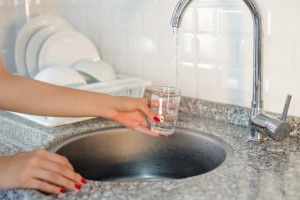 Hard water is present when the fresh water running into your home contains high levels of natural minerals, particularly magnesium and calcium. Hard water isn’t bad for your health but can cause problems for your plumbing.
Hard water is present when the fresh water running into your home contains high levels of natural minerals, particularly magnesium and calcium. Hard water isn’t bad for your health but can cause problems for your plumbing.
The amount of mineral deposits in your water can be measured to determine a hardness level, which is quantified through milligrams per liter. Understanding how hard water is classified can help you determine if you need to create a treatment plan to prevent damage to your appliances and plumbing.
Do I have hard water?
Rain water develops into hard water when it absorbs minerals. The mineral deposits are measured in milligrams per liter to determine the level of water hardness:
- Soft: 0–60 mg/L
- Moderately hard: 61–120 mg/L
- Hard: 121–180 mg/L
- Very hard: >181 mg/L
You can use water hardness test strips from your local home improvement or hardware store to measure levels in your home. A quick test is to pour a small amount of dish soap into a container, add water, and shake it. If the mixture doesn’t form a layer of suds, you’re likely dealing with hard water, as the minerals make it difficult for soap to lather.
Hard water problems
Without regular maintenance, pipes and appliances can be casualties of hard water. Here are some of the plumbing problems caused by hard water:
- Clogs
- Reduced water flow
- Appliances can run less efficiently
- Soap buildup in shower, tub, and sinks
- Mineral deposits settle in water heater, reducing its lifespan
- Mineral deposits build up inside pipes, fixtures, and appliances
- Difficulty cleaning clothes, dishes, and skin because soap doesn’t lather well
Older homes made with steel pipes are particularly at risk to mineral buildup, which can cause the pipes to burst or clog completely. Most modern homes are constructed with plastic or copper pipes, which aren’t as susceptible to buildup, but can still suffer clogs.
The hot water heater often gives the first signs that hard water is running through your pipes. The energy efficiency of a water tank can drop substantially if scale and sediment settle in the bottom. In order to heat the water, the tank must first heat through the layers of mineral buildup, which can reduce the life span of your tank – not a cheap fix.
Water softner
For moderate hard water levels, a water conditioning product will likely make laundry and cleaning dishes easier, but for serious hard water situations, a whole-house water softener may be worth the investment. These systems can range from $700 to $2500 and above. While that can be a heavy upfront cost, the price of new plumbing due to mineral buildup will be much more costly.
